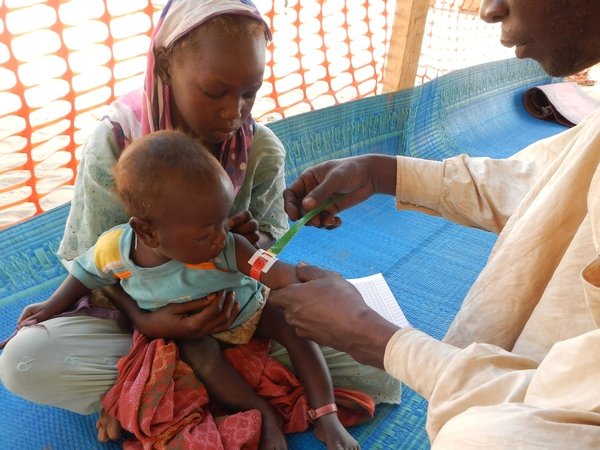Chad faces twin emergencies of acute malnutrition and meningitis

Immediate response needed to save lives and prevent deeper health crisis, says MSF
Severe acute malnutrition in parts of Chad’s Sahel belt has reached emergency levels and requires immediate life-saving intervention, according to the humanitarian agency Médecins Sans Frontières (MSF). In addition, an urgent response is also needed now to contain an expanding meningitis outbreak.
“Now we can see clearly that, in some parts of Chad, there are already very alarming rates of malnutrition among children,” warned Dr Kodjo Edoh, MSF’s head of mission in Chad. “We are concerned that this situation might also be affecting other districts in the country and we urge the Chadian government and humanitarian agencies to investigate and act.”
A nutrition assessment conducted in February by the organization in the district of Biltine, in Wadi Fira region in Chad’s east, found a severe acute malnutrition rate among children 0-5 years of age of 6.5% and a global acute malnutrition rate among the same age group of 24.3%, measured by weight-for-height and Z scores*. This is concerning as, usually, February is the month with the lowest malnutrition rates. These rates represent a considerable deterioration: in August-September 2011, UNICEF found the corresponding rates of malnutrition in the area were 4.6% for severe and 18% for global. Several factors appear to play a role: a below-normal harvest, pests, and a plummeting economy because of reduced remittances from Libya.
This week, MSF will open an emergency nutrition intervention in the town of Biltine, in collaboration with the Chadian Ministry of Health, comprising one intensive therapeutic feeding centre plus treatment for critically-ill non-malnutrition cases; ambulatory therapeutic feeding centres in the outlying areas are also planned shortly. Elsewhere in Chad, MSF has just started a nutrition intervention in Yao, in Batha region, incorporating inpatient and ambulatory care, as well as primary health care and vaccination, also responding to high levels of severe acute malnutrition. An assessment is ongoing in the regions of Hadjer Lamis, Abéché and Ouaddai.
Meanwhile, a meningococcal meningitis outbreak has hit the country: eight districts have surpassed the epidemic threshold for the disease and four other districts are on alert. In the eastern Oum Hadjer district, there have been a total of 209 cases to date and 8 deaths; the epidemic threshold was passed in the week of February 12. The south-eastern Am Timan district has experienced 147 cases and 8 deaths, and reached epidemic levels in the week of March 18. The numbers of meningitis cases in the districts of Am Dam, Abou Deia, Lere, Dono Manga, Massakory and Bedjondo have also reached epidemic levels.
In response, MSF will launch, in collaboration with the Ministry of Health, mass meningitis vaccination campaigns targeting over 900,000 persons aged 1-29 in Oum Hadjer, Am Timan, Lere and Pala districts in the coming weeks. The campaigns will utilize the new MenAfriVac vaccine against meningitis, which confers longer immunity for a wider section of the population than previous vaccines. In all the districts, case management for patients ill with the disease will also be provided.
MSF has been working in Chad since 1981.It presently provides medical assistance in Am Timan, Moissala, Massakory and Abéché, as well as responding to nutritional and epidemic emergencies.
*Editor’s note: Acute malnutrition is caused by a significant imbalance between nutritional intake and individual needs. It is most often caused by both quantitative (number of kilocalories/day) and qualitative (vitamins and minerals) deficiencies. Acute malnutrition is measured by measuring a child’s weight and height and then expressing it as a “Z score”. If a child’s Z score is under -3, it is classified as “severely malnourished”; if between -3 and -2, as “moderately malnourished”. The two categories together are “global malnutrition”. The UN’s Integrated Food Security Classification System considers the “emergency threshold” to be 15% for global acute malnutrition.





Leave a Comment